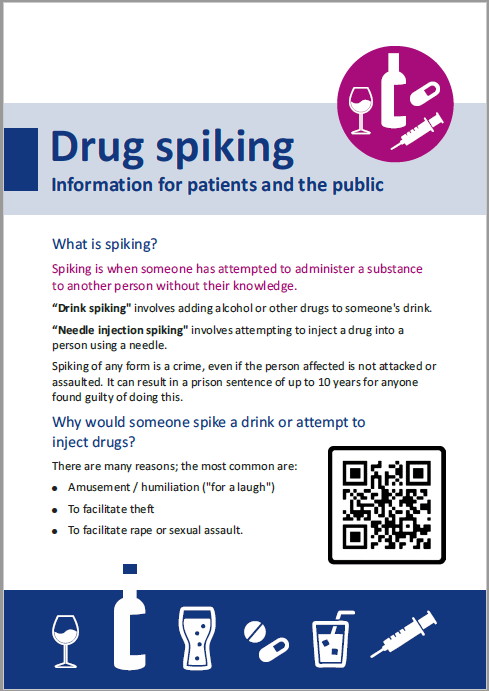Spiking
On this page
- What is spiking?
- Why would someone spike a drink / attempt to inject drugs?
- What symptoms will I have if I have my drink spiked / been injected with drugs?
- Will I be able to tell if I have been spiked?
- What should I do if I think I have been spiked?
- How can I try to prevent my drink from being spiked, keeping myself and others safe?
- What help is available?
- NHS
- Supporting Victims in North Yorkshire
- Mental health crisis line
- NHS Mental Health Services
- First Response – crisis service
- North Yorkshire Horizons Adult Drug and Alcohol Recovery Service
- University of York Students’ Union
- Support for victims and witnesses of crime
- North Yorkshire Youth Commission
- Make a complaint about, or compliment the police
- Ask For Angela
- Resources
- Thank you to the following organisations for providing this information
What is spiking?
Spiking is when someone has attempted to administer a substance to another person without their knowledge. “Drink spiking” involves adding alcohol or other drugs to someone’s drink. “Needle injection spiking” involves attempting to inject a drug into a person using a needle.
Spiking of any form is a crime, even if the person affected is not attacked or assaulted. It can result in a prison sentence of up to 10 years for anyone found guilty of doing this.
Why would someone spike a drink / attempt to inject drugs?
There are many reasons; the most common are:
- Amusement / humiliation (“for a laugh”)
- To facilitate theft
- To facilitate rape or sexual assault.
What symptoms will I have if I have my drink spiked / been injected with drugs?
This will depend on:
- The type and amount of drug or alcohol used
- How much alcohol you have (knowingly) had to drink
- If you are taking medication (drugs)
- Your body size and age
Symptoms can develop within 5 – 20 minutes and last for up to 12 hours.
The drugs used often make you feel sleepy or weak. They can reduce your ability to defend yourself or make informed choices, as you may not be aware of what is going on around you.
Common symptoms include:
- Appearing drunk
- Dizziness, disorientation & difficulty walking
- Confusion, tiredness – especially the next day or after waking up
- Starting to feel unwell – Nausea (feeling sick) or vomiting (being sick)
- Hallucinations (seeing things that are not there)
- Visual problems, for example, blurred vision
- Paranoia (a feeling of fear or distrust of others)
- Amnesia (loss of memory), especially about things that have happened recently.
- High doses of some drugs used to spike drinks can cause problems with your muscles, a coma (a very deep unnatural sleep) and death.
Will I be able to tell if I have been spiked?
Victims must not be dismissed as ‘just being drunk’ if they suspect that they have been spiked or suddenly feel drunk, nauseous, or unwell.
It is hard to tell if a drink has been spiked. The drugs are usually tasteless, odourless (no smell) and have no colour so you would not normally notice them. There is also an urban myth that ice sinks in a drink that has been spiked – but this is not true.
You may or may not know whether someone has attempted to inject drugs into you. This depends upon many factors, including the site of the injection, the size of the needle and the type and quantity of drug injected.
What should I do if I think I have been spiked?
If you begin to feel drunk after having only a small amount or no alcohol, you think your drink may have been spiked or you feel that a needle has pricked you then you should:
- Get help from a friend or relative you trust or a member of staff/ welfare staff if you are in a club or pub
- Avoid going to the toilet alone or outside in the street alone.
- Go to a place of safety as soon as possible; but only go home with someone you totally trust. If you are in with someone you do not know, contact a trusted friend or relative to come and take you home and look after you. If this is not possible, call 999 and ask for the Police.
- If you start to feel very sleepy, vomit or hallucinate, you should visit the local Emergency Department immediately.
- You should also contact the Police to report the incident, as drink & needle spiking is a crime. The Police will arrange for a sample of your blood or urine to test under forensic conditions. It is important you are tested as soon as possible if you think you have been spiked as most drugs leave your body within 12 – 72 hours.
- If needle spiked the injection site should be photographed by police CSI.
- Bar staff need to try and preserve the suspected spiked drink.
- The Emergency Department does not offer blood or urine tests because they are unlikely to change the treatment you might need (if any treatment is required) and the tests done in the Emergency Department cannot be used in a criminal investigation.
- The risk of transmission of blood borne viruses from a “spike needle” is considered so low that the routine offering of testing/preventative immunisation is not warranted.
How can I try to prevent my drink from being spiked, keeping myself and others safe?
- Never leave your drink unattended and keep an eye on friends’ drinks
- Drink from a bottle rather than a glass if you can. It is more difficult to spike a drink in a bottle, especially if you keep your thumb over the opening.
- Always keep your drink in your hand
- Never accept a drink from someone who you do not know or trust
- Never share, swap, or drink any left-over drinks
- If you go out with someone you do not know; tell a friend or relative where you are going and what time you expect to be back as you could be spiked in a private setting.
Some clubs or pubs can provide devices which can reduce the risk of your drink being spiked. You can also buy special plastic tops to go in bottles from supermarkets. There are also kits available in many pubs and clubs so you can test your drink to see if it has been spiked.
If you think your drink may have been spiked do not drink it.
What help is available?
NHS
Tees Esk and Wear Valley
https://www.tewv.nhs.uk/
Supporting Victims in North Yorkshire
For when you’ve been a victim of crime or think you may have been.
https://www.supportingvictims.org/
01609 643100
Mental health crisis line
For children, young people, adults and older people
0800 051 61 71 (24 hours – 7 days a week)
NHS Mental Health Services
https://www.nhs.uk/nhs-services/mental-health-services/
First Response – crisis service
Bradford / Craven
https://www.bdct.nhs.uk/services/first-response/
0800 952 1181
North Yorkshire Horizons Adult Drug and Alcohol Recovery Service
https://www.nyhorizons.org.uk/
08000 14 14 80
University of York Students’ Union
Support for students at York University
www.yusu.org/signposting
Support for victims and witnesses of crime
North Yorkshire Youth Commission
https://www.northyorkshire-pfcc.gov.uk/youthcommission
Make a complaint about, or compliment the police
https://www.northyorkshire-pfcc.gov.uk/how-can-we-help/complaints/police/
Ask For Angela
People who feel unsafe, vulnerable or threatened can discreetly seek help by approaching venue staff and asking them for ‘Angela’. This code-phrase will indicate to staff that they require help with their situation and a trained member of staff will then look to support and assist them.
Resources
Short URL to this page: https://bit.ly/5piked
Thank you to the following organisations for providing this information
- York & North Yorkshire NHS
- University of York Students’ Union
- North Yorkshire Horizons Drug & Alcohol Service
- North Yorkshire Youth Commission
- North Yorkshire Police
- North Yorkshire Police, Fire and Crime Commissioner.


